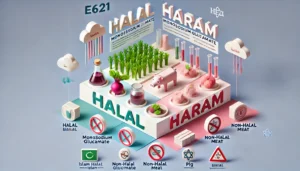E621, or monosodium glutamate (MSG), is a popular food flavour enhancer added to most processed and packaged foods. For Muslim consumers, the difficult question is: Is E621 halal or Haram? The answer varies depending on its origin and the method of creation.
Is e621 Halal or Haram?
Monosodium Glutamate (MSG) is the sodium salt of glutamic acid, an amino acid (bodybuilding internal chemicals), a naturally occurring amino acid found in the human body, and other foods such as tomato, cheese, and mushrooms. MSG introduces umami (a savoury taste) to foods, which improves the taste profile of these foods. Just like how MSG enhances flavor, reciting Surah Yaseen brings spiritual nourishment and peace to the soul.
Because E621 is such a common salinity enhancer, Muslim people should know Halal standards in its use. So, is E621 Halal or Haram? We must investigate this substance thoroughly to determine its origin and the process by which it was manufactured.
Every day, food products that contain E621 include:
- Instant noodles
- Potato chips and crisps
- Canned soups
- Frozen dinners
- Seasoning powders and bouillons
Production methods:
- Fermentation from plant-based sugars (e.g., sugar beet, sugar cane)
- Synthetically from starch or molasses
- Rarely from animal sources, which raises concern among Muslim consumers
Understanding Halal and Haram in Islam
In Islam, there are Halal and Haram for all food and substances, which means that there are permitted and prohibited groups of them. It states in clear Islamic law of food and beverage that all foods and drinks should be lawful and pure. The Quran explicitly emphasizes the importance of consuming food that is both wholesome and permissible:
In Islam, food and beverages are categorized as:
- Halal: Lawful and permissible
- Haram: Unlawful and forbidden
“يَا أَيُّهَا الَّذِينَ آمَنُوا كُلُوا مِنْ طَيِّبَاتِ مَا رَزَقْنَاكُمْ وَاشْكُرُوا لِلَّهِ إِنْ كُنْتُمْ إِيَّاهُ تَعْبُدُونَ”
”O you who have faith, enjoy the permissible things that are permitted by Allah and be thankful to Allah, if it is Him you really worship.” (Quran 2:172)
Is E621 Halal or Haram?
The halal status of E621 depends on its source:
✅ Halal Sources:
- MSG made through plant-based fermentation or synthetic means
- Approved by Halal certification bodies like IFANCA (USA), HFA (UK), or JAKIM (Malaysia)
Haram Sources:
- MSG derived from non-halal animal sources or animals not slaughtered according to Islamic law
“If it is derived from something halal, then it is permissible. If it is derived from something haram, then it is not permissible to consume.” — Dr. Muhammad al-Munajjid
Some Islamic scholars also use the principle of Istihalah (transformation). If a haram substance turns into an entirely new substance, it can be halal. This interpretation does not align with the views of scholars or Islamic schools of thought.
Global Halal Certification Perspectives
| Certification Body | MSG (E621) Stance |
|---|---|
| IFANCA (USA) | Permits MSG from plant-based/synthetic sources |
| HFA (UK) | Certifies MSG if derived from permissible ingredients |
| JAKIM (Malaysia) | Approves only if verified plant-based or synthetic origin |
| GIMDES (Turkey) | Cautions against MSG due to health and source concerns |
Halal & Haram Food Additives (Quick Reference Table)

| E-Code | Function | Halal Status | Notes |
|---|---|---|---|
| E100 | Coloring (Curcumin) | Halal | Natural turmeric-based color. |
| E120 | Coloring (Carmine) | Haram | From crushed cochineal insects. |
| E140 | Coloring (Chlorophyll) | Halal | Plant-based. |
| E160a | Coloring (Beta-carotene) | Halal | Plant-derived (carrots, etc.). |
| E322 | Emulsifier (Lecithin) | Halal (soy-based) / Depends | Usually soy-derived (halal); check if from egg or animal source. |
| E325–E327 | Preservatives (Lactates) | Halal | Derived from fermentation of sugars. Not related to milk. |
| E400–E405 | Thickeners (Alginates) | Halal | Seaweed-derived. |
| E406 | Gelling agent (Agar) | Halal | Extracted from red algae. |
| E407 | Thickener (Carrageenan) | Halal | Derived from seaweed. |
| E410 | Thickener (Locust bean gum) | Halal | Derived from carob tree seeds. |
| E471 | Emulsifier (Mono-/Di-glycerides) | Depends | Can be plant- or animal-based; source verification needed. |
| E472a-f | Emulsifiers (Esters) | Depends | Origin (plant or animal) must be confirmed. |
| E481–E482 | Emulsifiers (Stearoyl lactylates) | Depends | Can be from plant or animal fat. |
| E491–E495 | Emulsifiers (Sorbitan esters) | Depends | Source of fatty acids must be verified. |
| E500 | Acidity regulator (Baking soda) | Halal | Sodium carbonate. |
| E542 | Anti-caking agent (Bone phosphate) | Haram | Derived from animal bones. |
| E621 | Flavor enhancer (MSG) | Halal (plant/synthetic) / Haram (animal-based) | Most commercial MSG is synthetic and halal. |
| E627 | Flavor enhancer (Disodium guanylate) | Depends | Often made from yeast or fish; verify source. |
| E631 | Flavor enhancer (Disodium inosinate) | Depends | Can be from fish (halal) or animal tissues (haram). |
| E635 | Flavor enhancer (Ribonucleotides) | Depends | Blend of E627 & E631; origin must be checked. |
| E901 | Glazing agent (Beeswax) | Halal | From bees. Permissible in Islam. |
| E904 | Glazing agent (Shellac) | Doubtful | From lac insect; scholarly differences. |
| E951 | Sweetener (Aspartame) | Halal | Chemically synthesized. |
| E953 | Sweetener (Isomalt) | Halal | Sugar alcohol; synthetic. |
| E965 | Sweetener (Maltitol) | Halal | Derived from starch. |
| E966 | Sweetener (Lactitol) | Depends | From lactose; verify if milk-derived. |
| E967 | Sweetener (Xylitol) | Halal | Plant-based. |
| E999 | Foaming agent (Quillaia extract) | Halal | From tree bark. |
Health and Safety Concerns About MSG
The FDA and EFSA approve MSG, and the WHO considers it safe for consumption. However, some individuals may be sensitive and report symptoms such as:
- Headaches
- Nausea
- Flushing
- Dizziness
There is no consistent evidence that MSG is harmful to the general population.
Practical Tips for Muslim Consumers
- Look for Halal-certified products – Seek trusted certification logos (e.g., HFA, IFANCA).
- Inspect ingredient labels – Watch for “E621” or “Monosodium Glutamate.”
- Ask manufacturers directly – Companies can clarify the source of MSG.
- Use halal scanning apps – Tools like Scan Halal, Halal Check, and Muslim Pro are useful.
- Opt for natural umami – Mushrooms, seaweed, tomatoes, and nutritional yeast are great MSG-free alternatives.
Related E-Numbers to Monitor
- E620 – Glutamic acid (may be natural or synthetic)
- E622 – Monopotassium glutamate
- E627 – Disodium guanylate (often used with MSG)
- E631 – Disodium inosinate (potentially non-halal if animal-derived)
- E635 – A combination of E627 and E631
Always verify the source of these additives before consumption.
Scholarly Opinions and Islamic Guidance on E621
During debates on whether E621 is Halal or Haram, scholars who discuss it employ the concept of ijtimaah, not the Istimlahah concept of the Renaissance. The act becomes permissible after the substance has transformed into a different substance from the unlawful one. This principle, though, is not applied in the same way.
Another frequently cited Hadith emphasizes that all food must meet Islamic standards for purity and lawfulness:
“إن الله طيب لا يقبل إلا طيبا”
As Allah is Good and does not accept anything evil Allah does not accept any evil thoughts. (Hadith, Sahih Muslim)
This Hadith clearly states that Muslims are prohibited from eating foods that have not been accredited as lawful for consumption by Muslims; therefore, the inclusion of E621 requires clarity.
Some common Halal and Haram food additives and their sources:
- Check Certification: Therefore, checking for a halal logo to confirm whether the products are certified as halal is advisable.
- Contact Manufacturers: Sometimes, it can be confusing to determine the source of a specific additive; therefore, reaching out to the manufacturer clarifies any doubts.
- Regional Differences: Occasionally, some rulings may differ due to the discretion of Islamic legal jurisdiction.
FAQ on E621 (MSG)
Q1. Is E621 halal or haram?
A: It is halal if derived from plant or synthetic sources. If animal-derived and not from a halal-slaughtered source, it is Haram.
Q2. What foods contain E621?
A: Instant noodles, canned soups, flavored chips, processed meats, frozen meals, and seasoning blends.
Q3. Can I trust MSG with halal logos?
A: Yes, if certified by a reputable halal body such as HFA, JAKIM, or IFANCA.
Q4. Are there halal-friendly alternatives to MSG?
A: Yes, try yeast extract, seaweed, soy sauce, mushroom powder, or tomato paste.
Conclusion: Should Muslims Avoid E621?
E621 is halal when derived from sources such as plants or synthetic production. However, its status becomes questionable when derived from animals, especially if the origin and processing methods are unclear.
Muslim consumers should:
- Prioritise halal certification
- Check product ingredients carefully
- Contact manufacturers when in doubt
- Educate themselves on common food additives and their sources
With growing awareness and tools available, Muslims can make informed, religiously sound food choices.




